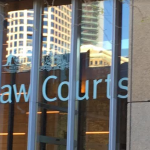The Rules for Changing a Plea from Guilty to Not Guilty

On 30 June 2004, Raymond Wong pleaded guilty before a magistrate in the Sydney Local Court to one count of committing an act of indecency, contrary to repealed section 61N of the Crimes Act 1900 (NSW). At the time, Wong was represented by a firm of experienced criminal defence lawyers.
Mr Wong stood accused of committing an act of indecency for allegedly touching the breast of a customer at his hair salon. Since December last year, a person in Wong’s position could potentially be charged with the new offence of sexual touching under section 61KC of the Crimes Act, which carries a maximum penality of 18 months prison.
Following the plea, a sentencing date of 11 August was set. But in the interim, Wong changed lawyers and his new lawyer appeared before the same magistrate to apply to have the guilty plea traversed – in other words, changed to a not guilty plea – so the case could proceed to a defended hearing.
However, after a brief hearing during which no evidence was presented, the magistrate refused the application and confirmed the sentencing date.
The second magistrate
On the day of sentencing, Mr Wong’s lawyer asked a different magistrate if the hearing could be held in the court list as they were waiting on a barrister. The magistrate agreed. The lawyer then reapplied for the plea to be reversed.
The second magistrate refused to hear the application on the basis the matter had already dealt with it. The lawyer countered that he had a new affidavit that was not before the previous magistrate. The magistrate nevertheless stood firm and refused to hear the additional application.
When the barrister attended court later that day, the magistrate once again refused to hear the application.
The appeal
On 24 February 2005, Mr Wong’s appeal against the second magistrate’s decision came before Justice Roderick Howie of the NSW Supreme Court.
The justice initially said he couldn’t understand how it came to be that the initial plea traversal application was made without presenting evidence to support it. He asserted that the first magistrate should not have determined the matter without evidence being provided.
Justice Howie pointed to a list of authorities which outline the circumstances whereby a guilty plea may be traversed. That list is conveniently contained in the 2001 NSW Court of Criminal Appeal (NSWCCA) case Regina versus Hura. It sets out the following situations:
- Where the appellant ‘did not appreciate the nature of the charge to which the plea was entered’ (Regina v. Ferrer-Esis (1991) 55 A. Crim. R. 231 at 233).
- Where the plea was not ‘a free and voluntary confession’ (Regina v. Chiron (1980) 1 NSWLR 218 at 220 D-E).
- Where the ‘plea was not really attributable to a genuine consciousness of guilt’ (Regina v. Murphy [1965] VR 187 at 191).
- Where there was ‘mistake or other circumstances affecting the integrity of the plea as an admission of guilt’ (Regina v. Sagiv (1986) 22 A. Crim. R. 73 at 80).
- Where the ‘plea was induced by threats or other impropriety when the appellant would not otherwise have pleaded guilty … some circumstance which indicates that the plea of guilty was not really attributable to a genuine consciousness of guilt’ (Regina v. Concotta (NSWCCA, 1 November 1995, unreported)).
- The ‘plea of guilty must either be unequivocal and not made in circumstances suggesting that it is not a true admission of guilt’ (Maxwell v. The Queen (supra) at 511).
- If ‘the person who entered the plea was not in possession of all of the facts and did not entertain a genuine consciousness of guilt’ (Regina v. Davies (NSWCCA, 16 December 1993, unreported)). See also Regina v. Ganderton (NSWCCA, 17 September 1998, unreported) and Regina v. Favero [1999] NSWCCA 320.
The Supreme Court justice listed a number of additional authorities that are relevant to determining whether a plea traversal should be allowed, including 1999’s Regina versus Iral, in which the failure of the accused to appreciate the nature of the charge, as well as difficulties understanding an interpreter, led to the traversal being allowed.
There was also 2001’s Regina versus Wilkes, which found the advice from counsel to enter a plea of guilty was inappropriate and constituted a miscarriage of justice. And also from 2001, his Honour cited Regina versus KCH which involved improper pressure from counsel to enter the plea.
Refused to exercise jurisdiction
A guilty plea is so significant, remarked Justice Howie, that if there’s any question around its integrity, it would make it unfair for a court to act upon it. And “there would inevitably be a miscarriage of justice by refusing to allow the defendant to withdraw the plea and defend the charge”.
Mr Wong had denied the allegation against him from the start. At the second hearing, his lawyer put it to the first magistrate that his plea was “based on the provision of inadequate legal advice by his former legal representatives”; although the specifics of that advice were never disclosed.
On appearing before the second magistrate, Mr Wong’s counsel explained that they had new evidence supporting the reason for the plea being traversed. According to the Supreme Court justice, this gave the new magistrate the jurisdiction to consider the application.
Justice Howie said that the second magistrate “erroneously” believed that he shouldn’t “hear the application made before him simply because the application had already been determined. In effect he refused to exercise his jurisdiction without good reason for doing so”.
Remitted to the lower court
Initially, Justice Howie had been offered the affidavit, so he could make a determination on traversing the plea himself. However, his Honour found that the matter should be sent back to the Local Court to consider the application with the input of the fresh evidence.
Justice Howie did, however, read the affidavit before noting it warranted consideration. And without going into the finer details, the justice explained that it showed Mr Wong had followed his lawyer’s advice, even though he denied his guilt.
Reconsidering the traversal
If a plaintiff follows legal advice and pleads guilty at a time when they’re confused, the plea should be traversed, explained the judge. However, if they pleaded guilty for some advantage, and later believed this was a wrong move, this would not justify a traversal.
“I should also point out that not only does a defendant bear the onus of proof in relation to an application to withdraw a plea of guilty,” Justice Howie explained, “he must establish ‘a good and substantial reason for the court taking that course.’”
So, on 3 March 2005, the Supreme Court ruled that the appeal be allowed in regard to the decision of the second magistrate. Because of this, there was no reason for the actions of the first magistrate to be formally ruled upon.
The matter was remitted to the Local Court to be heard once again and “conformably” with the present judgement. The Director of Public Prosecutions – who was handling the case on behalf of the NSW Police Force – was ordered to pay Mr Wong’s legal costs.








